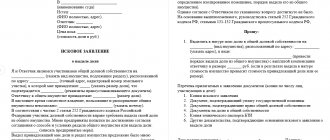Minor share in an apartment judicial practice
Payment of compensation to a participant in shared ownership by the remaining owners instead of allocating his share in kind is permitted with his consent.
In cases where the owner’s share is insignificant, cannot be realistically allocated and he does not have a significant interest in the use of the common property, the court may, even in the absence of the consent of this owner, oblige the remaining participants in the shared ownership to pay him compensation. In today's news, we will tell our dear readers the story of our client, who was literally thrown out of the house with her son.
We will tell you how we solved her problem and what can be done in this situation and how to deal with apartment invaders. In history
Grounds for buying out the owner's share in court
Termination of property rights is possible only in cases specified by law : when the owner alienates his property to other persons, destruction or destruction of property, renunciation of property rights and in other cases of loss of property rights.
For the forced seizure of property from the owner, legal grounds are required, the list of which is listed in Article 235 of the Civil Code of the Russian Federation, and is exhaustive.
One of these grounds is the alienation of property provided for in paragraph 4 of Article 252 of the Civil Code of the Russian Federation.
This provision of the law provides that payment of compensation to a participant in shared ownership instead of allocating his share in kind is allowed only with his consent. However, the court may, even in the absence of the consent of this owner, oblige the remaining owners to pay him compensation, but only in the presence of a combination of three exceptional circumstances:
- The share of this owner is insignificant (for example, 1/21 share in the common property)
- The share cannot be actually allocated (cases when it is an apartment or room with one entrance, there is one bathroom, one kitchen)
- This owner does not have a significant interest in the use of the common property (he does not actually live in the residential premises and does not need this housing)
If only one or two of these factors are present, forced redemption of a share is impossible. It is no coincidence that the legislator established the need for the simultaneous presence of these factors, since otherwise the balance of interests of participants in common property will be upset.
For example, if the owner of a microshare, nevertheless, lives in this premises and has no other housing, then this indicates that he has a significant interest in using his share. In this case, even the fact that the share is insignificant and the impossibility of allocating it will not be grounds for depriving him of housing.
In addition, according to the position of the Constitutional Court of the Russian Federation in a number of definitions (including dated October 13, 2009 No. 1359-О-О), the court, when considering a case and resolving an issue and whether or not a person has a real interest in using a minor share, must also establish how commensurate this interest is with the inconvenience that may be caused to the other owner.
In practice, the courts also find out when and how the ownership of each of the co-owners arose, whether the owner acquired an insignificant share, knowing that the largest part of the residential premises belongs to someone else, and that his small share will not allow him to live in this premises together with others ; whether the owner of a small share abuses his right, for example, using his share to register other persons, trying to rent, etc.
Conclusion: Judicial repurchase of a small share in the common property is possible , despite the complexity of these disputes.
This position is confirmed by the Supreme Court of the Russian Federation , in particular, in the ruling dated 04/03/2012 No. 5-B11-134.
Moreover, in August 2021, the Supreme Court of the Russian Federation, in cassation, issued an unprecedented ruling in civil case No. 78-KG16-36, which overturned the decisions of the lower authorities of St. Petersburg, which rejected the claim for the forced purchase of a 1/3 share in a three-room apartment, with that the defendant's share corresponded to a separate room. The Supreme Court of the Russian Federation indicated that the lower courts did not take into account that the defendant does not actually use his share, using the room only to store his things, and does not bear the costs of its maintenance, i.e.
has no interest in using its property, and also noted the defendant’s dishonesty and other circumstances that make it possible to recognize the defendant’s share as insignificant.
Of course, such a case requires a competent approach from a lawyer who will be able to correctly apply all the technologies of evidence, and if the conditions established by law are met, the case on the forced purchase of a share in a residential premises will be won.
Minor (insignificant) share in the apartment
A participant in shared ownership has the right to be given for his possession and use a part of the common property commensurate with his share, and if this is not possible, he has the right to demand from other participants who own and use the property falling on his share, appropriate compensation.
The shares owned by ______________ ______________ account for ______________ sq.m. of the total area of the apartment, which cannot be an independent object of housing relations; accordingly, there is no real possibility of using for living the ______________ living space in the apartment.
Minor share in an apartment: definition, documents, use, right to sell
- The impossibility of allocating the plaintiff an isolated room corresponding to the size of his share.
- The applicant never moved into the disputed area.
- The remaining participants in shared ownership are strangers to the plaintiff.
- When concluding an agreement (for example, when purchasing an object), the applicant knew about the situation with the property.
- The former sharecropper did not use the facility.
- Before the claim was brought against him, the participant did not ask to enter the apartment and did not challenge his rights.
Recognition of a share as insignificant is a rather labor-intensive and lengthy procedure. First of all, the interested party files a claim in court. The application is drawn up according to the rules of the Civil Procedure Code. The claim is filed in the district court located at the address where the disputed property is located. The subject of the application will be recognition of the right. In practice, a number of conditions have been developed that ensure the likelihood of winning a dispute. The findings of the Supreme Court are worth mentioning here. In its rulings, the court emphasized that, allowing for the possibility of buying out a share, the legislator proceeded from the exclusivity of such situations.
A small share of an apartment judicial practice 2021
Considering one of the cases of “forced” redemption of a share from a participant in shared ownership (apartment), the Supreme Court of the Russian Federation pointed out the obligation of the courts to establish the existence of circumstances under which the legislator, in Article 252 of the Civil Code of the Russian Federation, allowed the use of such forced payment:
On the one hand, this rule corresponds to the constitutional law on the protection of private property, on the other hand, the remaining participants in shared ownership are the same owners, and their right of ownership (the ability to use property) is limited by the rights of the owner of a small share. And this article still creates difficult legal situations to resolve.
How to evict an apartment owner who owns a negligible share
Last week, the Supreme Court of the Russian Federation issued its next clarification, in which it provided explanations for lower courts regarding the rights of owners of small shares in one residential building.
Judges of the Supreme Court of the Russian Federation considered a civil case involving a dispute between a married couple and a stranger. The essence of the dispute is as follows: the family lived in an apartment of three rooms and was the owner of most of it. Further, in the same apartment, a person unfamiliar to the family acquired a small share under a civil contract, who initiated a civil lawsuit to move him into the above-mentioned apartment.
Cases of this kind, in which one of the parties is the owner of an insignificant share in a residential premises, are submitted in large numbers to the judicial authorities. Such situations provoke social tension in society. In addition, similar cases become the main topics in the media specializing in crime news. In general, the attackers’ scheme is quite simple and understandable. Consciously purchased in a residential area 1/50 share or even less. Citizens move into this premises, whose main task is to create inhumane living conditions for the remaining homeowners. As a result, the latter are forced to part with their property for frankly ridiculous money, or simply run for their lives.
For a long period of time, law enforcement agencies behaved more than amorphously, sending the parties to sort things out in court. Now, thanks to the public outcry, things are much better. Several criminal groups are already serving their sentences.
The recently issued clarification of the RF Armed Forces is intended to help holders of shares in residential premises in resolving the dispute. As part of the case, the judges examined the results of a similar dispute between citizens from Novosibirsk. A citizen, who is the owner of a 3/9 share in a three-room apartment, filed a claim against the married couple to move into the Novosibirsk district court. The rest of the housing was owned by the family, who lived in it on a permanent basis. The Novosibirsk court of first instance refused to satisfy the stated demands. The appeal court overturned the decision of the first instance court and ordered the spouses not to interfere with the citizen’s use of the residential premises. In search of the truth, the couple turned to the Supreme Court of Russia.
Considering the case, the Supreme Court panel found that the court of first instance did not satisfy the plaintiff’s demands, since he never actually lived in the disputed apartment. The previous owner of a 3/9 share of the apartment did not determine the procedure for its use in court. The apartment itself does not have premises commensurate with the plaintiff’s share.
According to Article 288 of the Civil Code of the Russian Federation, Article 17 of the Housing Code of the Russian Federation, residential premises are used for the residence of citizens. Article 247 of the Civil Code of the Russian Federation states that citizens must use common shared property by mutual agreement. In the absence of such an agreement, in the manner determined by the court in its decision. The owner of a share can dispose of property corresponding to his share. When this is not actually possible, the owner of a small share may demand compensation for it.
In the case of the Supreme Court of the Russian Federation, it was established that the defendants are not related to the plaintiff. There is no room in the apartment corresponding to the plaintiff's share. The owner of the 3/9 share in the disputed apartment has never lived. Based on the above, the Supreme Court concluded that moving the plaintiff into the apartment would be a direct violation of Article 247 of the Civil Code of the Russian Federation.
Redemption of a share in court (minor shares)
In this case, the fact of allocation in kind of this smallest share is established in court. If it is not enough to allocate a separate premises, then the lawsuit is satisfied in favor of the owner of most of the property. In this case, the latter is obliged either to provide an equivalent exchange in kind or to compensate the defendant for the loss. The basis for calculating the value of an insignificant share is the market and cadastral value of the entire property, and then isolating the amount at which the share is valued. Most often, the owner of a small part remains satisfied with the funds received. However, he does not have the right to set his own price.
We recommend reading: Federal Migration Service telephone
The latter confirm the impossibility of allocating a share in kind and hand over documents assessing the value of all property and its shares. To confirm the fact that the owner of a smaller share does not fully own his part of the property, it is advisable to attach proof documents: tax statements, receipts for payment of utilities and other services. It would also be useful to invite witnesses who will confirm that the owner of the smaller share has not previously lived in it or used it at all.
How to recognize a share as insignificant and buy the share through the court
This arrangement only plays into the hands of the owner of a small share, because he will never sell it from the market for that kind of money in his life. For example, 1/4 in a 4-room apartment with adjacent rooms can still be realistically moved according to the situation, for 800 thousand rubles, and everything that is less is only for 100-200 thousand rubles. for registration. So, there is a direct benefit for small things to surrender, so to speak, into the hands of justice!
However, the bulk of the capital's population lives not in the center, but in the districts, where the price per square meter is much cheaper. From simple calculations it becomes obvious that for forced purchase in apartments of the middle and low-cost housing segment, it makes sense to include only completely microscopic shares, such as 1/30 or less, which are initially sold from the market for registration.
Minor share in the apartment
But it is possible to sell any share in the apartment; here the question of price and the desire to get rid of your problem as soon as possible arises. And in any case, this way out of the situation will be better than simply forgetting about your problem or donating your “small share” to relatives and neighbors. If you evaluate your share from licensed appraisers, then the value of your share will always be almost half the amount than when selling the entire apartment jointly with other co-owners. And the court, unfortunately, is forced to agree with this assessment. The cost of a share in an apartment depends on many factors: the size of the share in the apartment, the total number of owners in the apartment, registered and actually living persons in it, including minors, the possibility of access to the apartment, the presence of a certain procedure for using the share, the urgency of selling the share and many others apartment parameters. The price of a share in an apartment is determined by inspecting the home and studying the documents and the problem as a whole, and each time strictly individually and confidentially.
If it is impossible to determine the order of use of the residential premises due to the insignificant share of the new owners in the apartment, and these owners have never moved into the disputed apartment and for the owner of the larger share they are strangers - then the court accepts the assessment of the insignificant share by specialized experts and sets the amount of forced compensation. A small share in an apartment can be forcibly purchased by a co-owner by court decision, unless this share is the only home for the owner of the small share. And a significant share cannot be redeemed from the remaining co-owners even through the court, otherwise our constitutional principle of private property and the inviolability of the home is violated.
We recommend reading: How to fill out the 3rd personal income tax declaration for 2019 when buying an apartment
What is a minor share
The legislation, Article 252 of the Civil Code of the Russian Federation, mentions the possibility of forced purchase of a small share in an apartment, but there is no clear definition of what such a share is. According to general rules, a share can be considered insignificant when:
- It is too small to be isolated in nature.
- The owner of the share is not interested in using it.
This is a rather vague definition and therefore the court in each individual case will make an individual decision on whether to recognize the share as insignificant or not.
Minor share in an apartment judicial practice
In 1999, a woman bought a three-room apartment and after some time registered her husband in it. The family relationship did not work out, and during the divorce in 2008, the court divided the property as follows: 13/14 for the wife and 1/14 for the husband. The man no longer lived in this living space, and a year after the divorce proceedings, under a lifelong maintenance agreement with dependents, he transferred his two and a half (!) square meters to his son. He, in turn, having registered in the apartment as his place of residence, no longer showed any interest in the property. A few months later, the father broke the contract with his son and the owner of a small share, again under a maintenance agreement, became the ex-husband’s new wife, who registered there, but did not actually live. The owner of the main share did not want to put up with the frequent change of co-owners and went to court with a demand to force the wife of her ex-husband to sell 1/14. However, she filed a counterclaim, expressing a desire not only to move into the apartment, but also to allocate herself a room with an area of 11.4 square meters.
Firstly, 1/14 of the share in the disputed apartment is only 3.8 square meters, of which only 2.5 “square meters” are residential, and there are no rooms of this size in “three rubles”, so it is impossible to allocate them for use. Secondly, it was noted that before filing a claim for termination of ownership of the 1/14th share, the defendants did not make any claims, thereby agreeing with the existing procedure for using the disputed apartment.
Arbitrage practice
Example No. 1 : Cheboksary, 2021. Semenov G.K. files a claim to have his distant relative's share declared insignificant in order to be forced to buy it out. Based on the case materials, Semenov G.K. owns 9/10 of a three-room apartment with an area of 60 sq.m. The remaining 1 part belongs to the defendant, Romina V.S., who inherited it and has not used it since then, has not paid utilities and has never been interested in using it at all. 1/10 share of an apartment with an area of 60 sq.m., that’s only 6 sq.m. They cannot be isolated in nature. Taking into account all of the above, relying on Article 252 of the Civil Code of the Russian Federation, the court decided in favor of Semenov G.K.
Example: No. 2 : Moscow, 2021. Applicant P.S. Voronov submits an application to the court demanding that his brother's share in their common apartment be recognized as insignificant. Based on the materials of the case, the following situation arises: the brothers own a two-room apartment by right of joint shared ownership. Plaintiff Voronov P.S. is the owner of 3/5 parts of the apartment, and his brother – 2/5. The latter refuses to sell his part and evict from the housing because he has no other real estate and his share is quite enough to have undivided use of one room in this apartment. The court found that the defendant really has no other housing, and 2/5 of the share is 25 sq.m. which corresponds to the size of one room of this housing. Under such conditions, the share cannot be considered insignificant. The court refuses the plaintiff.
Judicial practice on valuation of shares in an apartment
The provisions on the allocation of an apartment are contained in Art. 244 Civil Code of the Russian Federation. It is important to distinguish joint ownership from shared ownership. Legally married spouses, partners in a peasant farm, as well as members of consumer or gardening cooperatives can jointly own residential real estate. Everyone else can own shared ownership. Spouses can own an apartment jointly until they decide to make an allocation for each family member.
The problem of forced purchase of a small share of residential premises interests many people. In addition, quite recently, in the spring of 2012, perhaps the first judicial buyout of a minor property in Russia without the consent of its owner took place. Why don't courts often make such decisions? And even the positions of the Constitutional and Supreme Courts are different?
What can you do with a small share in an apartment?
Any, even insignificant, share in an apartment gives the owner all the rights and obligations. He will be able to register any people on his share, sell his part, rent it out, and so on. But all this requires the permission of the co-owners (if the share cannot be allocated in kind). In many cases, such a piece of real estate is purchased only in order to obtain permanent registration in a particular locality. Only rarely does the owner actually use the share.
The owner is obliged to pay utility bills based on the actual size of his share.
Recognition and subsequent redemption of a minor share is a controversial and complex procedure that requires competent legal support. Experts will clarify some of the most popular and frequently asked questions during a free consultation, and they can also represent the client’s interests in court.
FREE CONSULTATIONS are available for you! If you want to solve exactly your problem, then
:
- describe your situation to a lawyer in an online chat;
- write a question in the form below;
- call Moscow and Moscow region
- call St. Petersburg and region
Save or share the link on social networks
(
1 ratings, average: 5.00 out of 5)
Author of the article
Natalya Fomicheva
Website expert lawyer. 10 years of experience. Inheritance matters. Family disputes. Housing and land law.
Ask a question Author's rating
Articles written
513
- FREE for a lawyer!
Write your question, our lawyer will prepare an answer for FREE and call you back in 5 minutes.
By submitting data you agree to the Consent to PD processing, PD Processing Policy and User Agreement
Useful information on the topic
3
Appeal against a court decision to evict an apartment
Eviction lawsuits are quite common. Often the defendant’s position on...
2
Eviction without provision of other accommodation
Can a citizen be left homeless if for some time...
3
Statement of claim for eviction of ex-spouse from residential premises
Having officially dissolved the marriage, the former spouses cease to be relatives, all of them...
5
Statement of claim for eviction and deregistration
The tenant violates all conceivable and inconceivable rules of the hostel. Ex-husband…
Privatization of a share, part in a municipal apartment
Privatization of an apartment is an inalienable right of any citizen of Russia. However, not...
2
Forced eviction of the owner from the apartment
The citizen is the owner of the residential premises. It doesn’t matter if he bought it, privatized it,...











